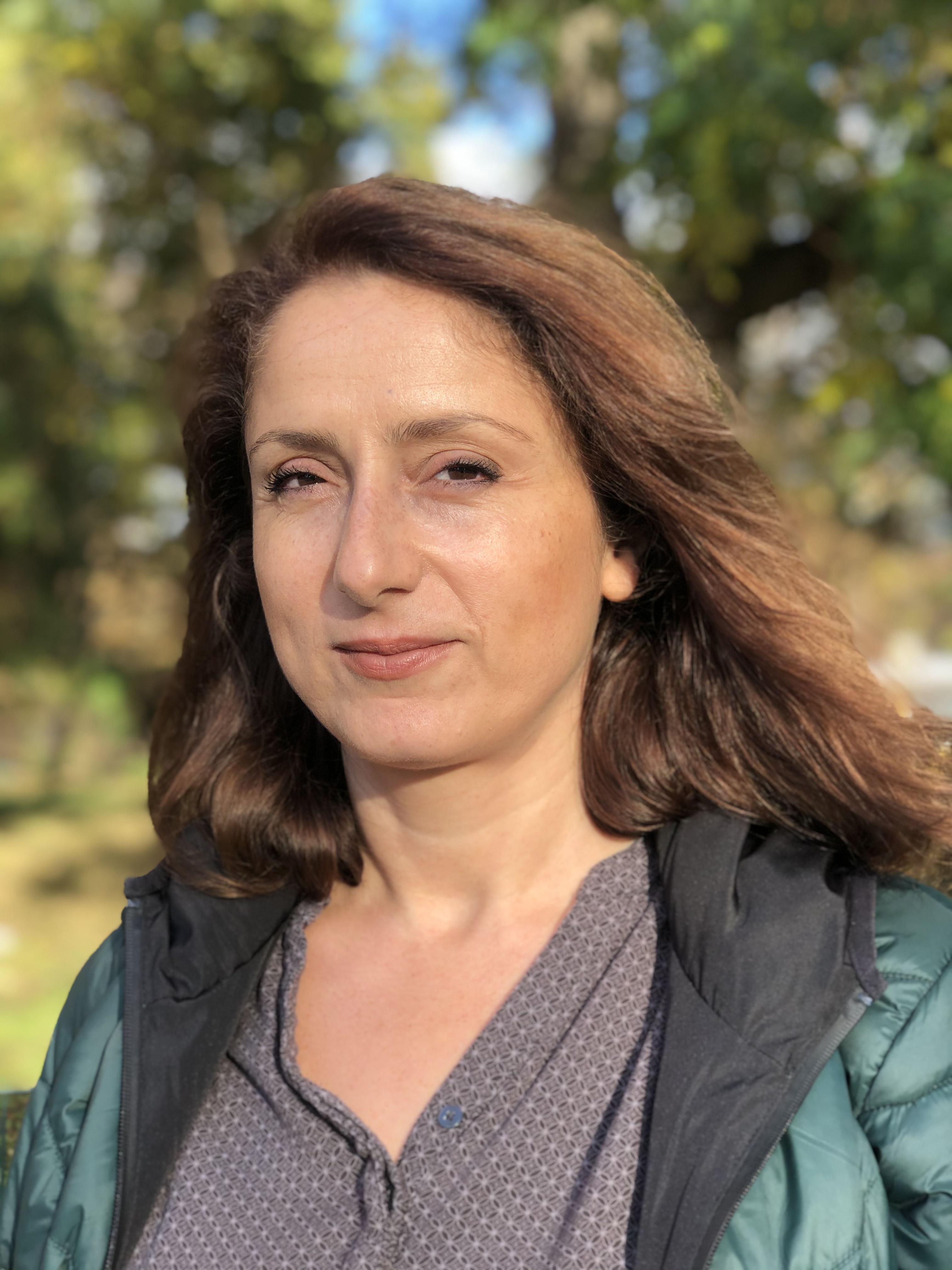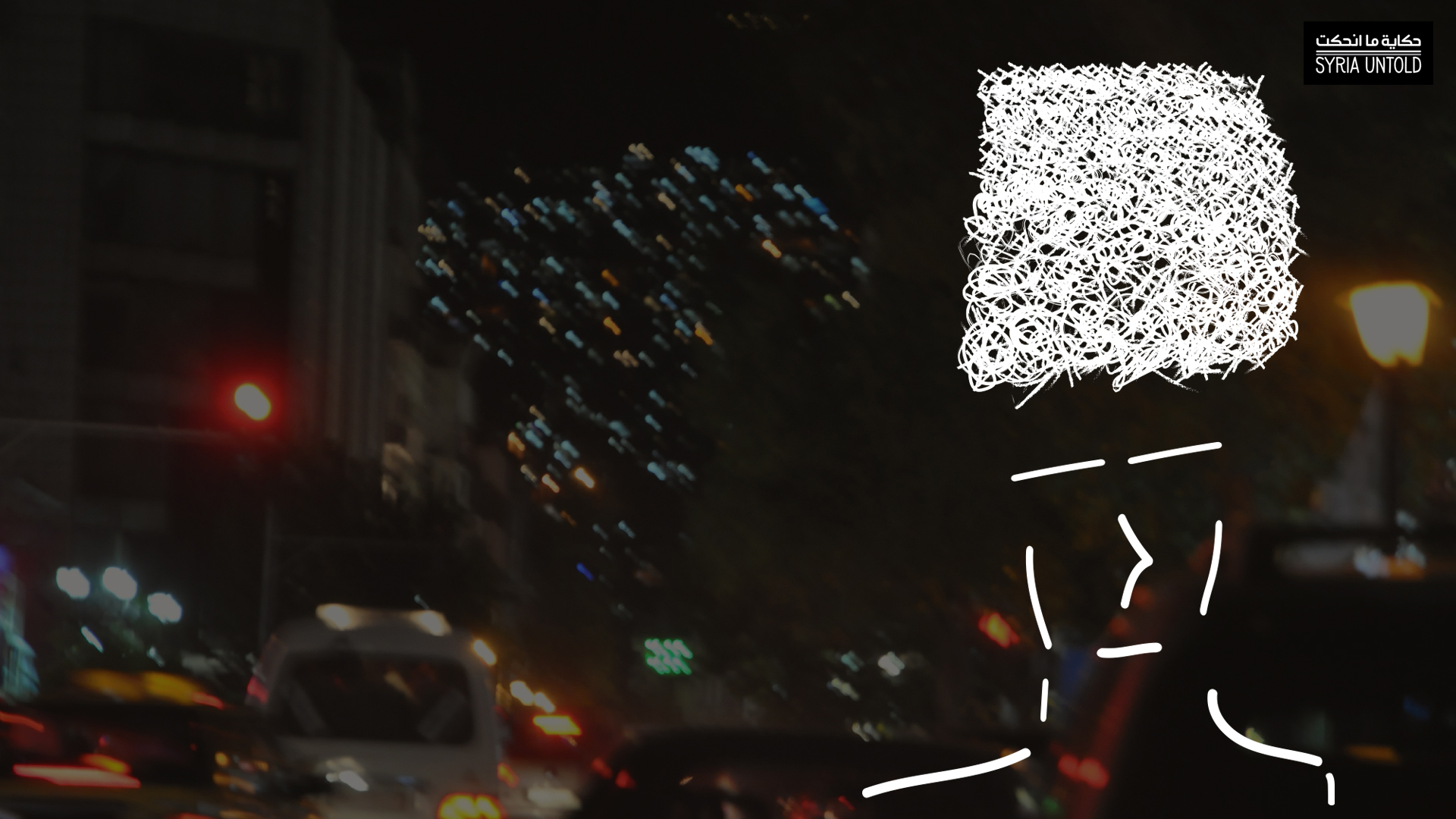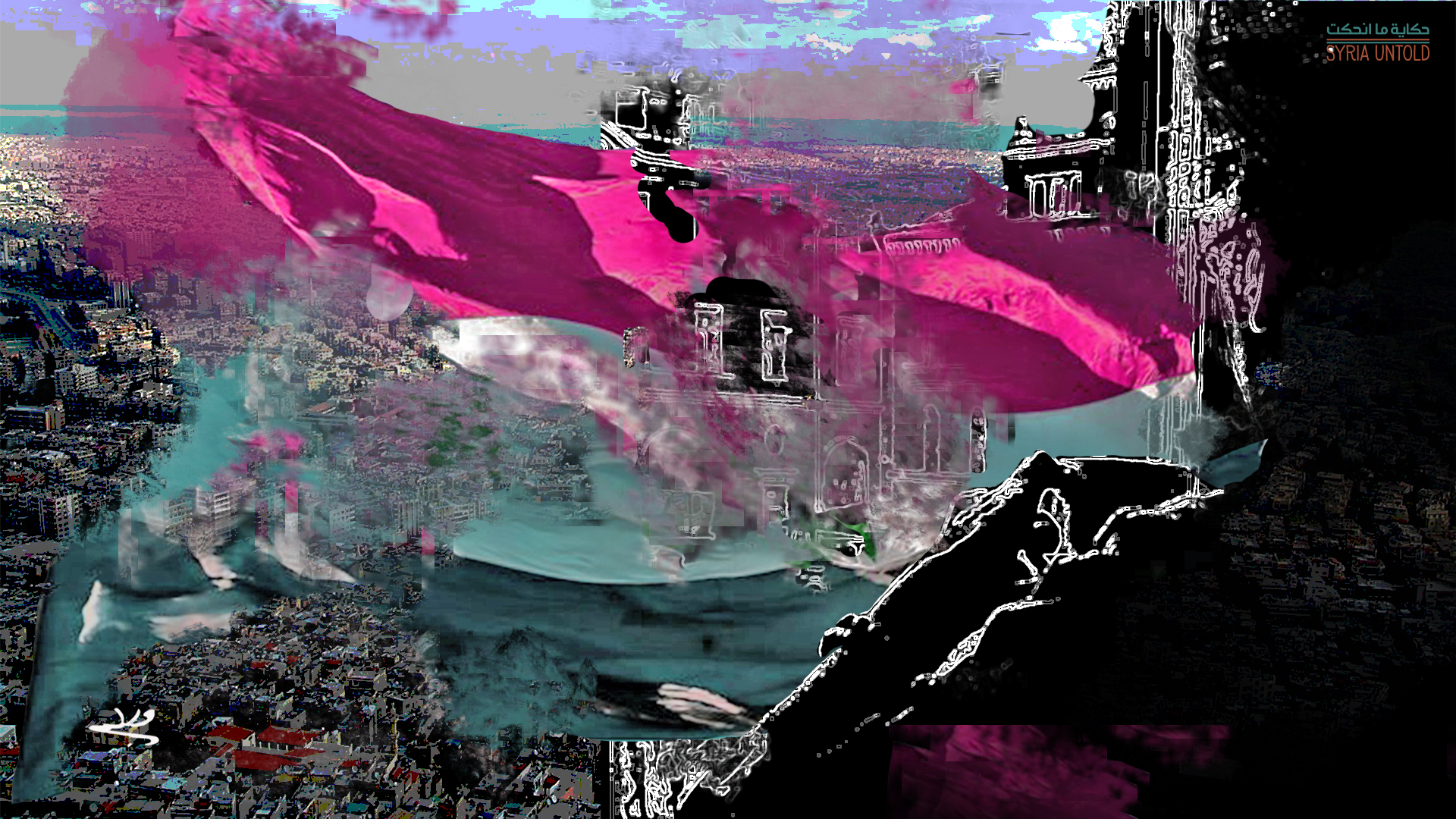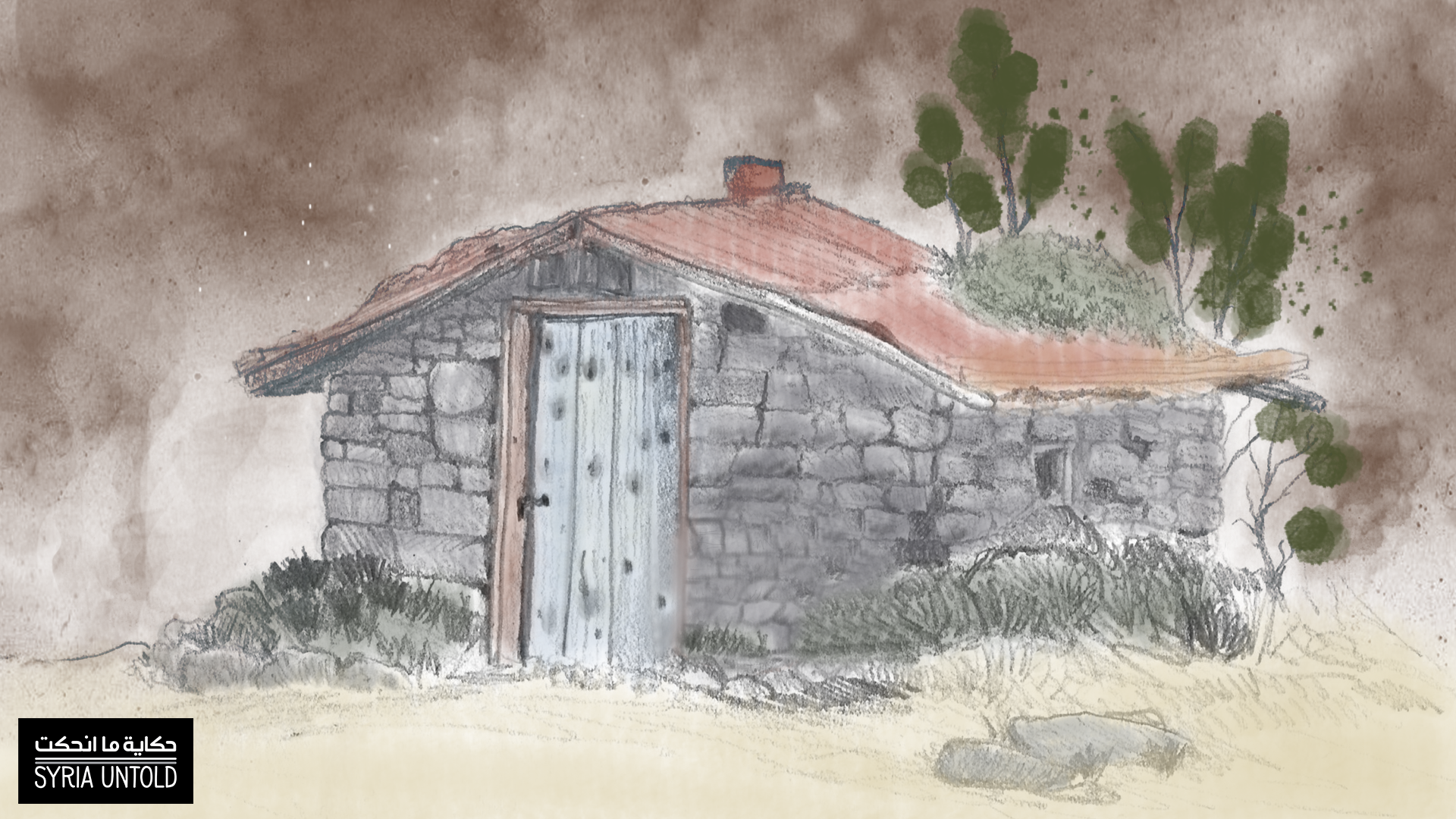This article is part of a series on love and sexuality among Syrians in Germany. It was published with support from the NewsSpectrum Fellowship Program. Read this piece in German at taz and in its original Arabic at SyriaUntold.
I wave as Omar* enters the park. He/she had been right—I recognize Omar immediately by the bright colors he/she wears, and by the wide-leg jeans that end just above ankle-length. The exposed red socks in particular catch my eye. And since I've stopped wondering about modern fashion meant for any gender, this outfit doesn't really surprise me. But Omar’s enormous energy does come as a surprise, as does the new line of kohl encircling his/her eyes.
"In my first weeks in Berlin, this neighborhood was hell for me," Omar tells me as we walk side by side through the streets of Neukölln. "I was exhausted and powerless, and some people took my weakness as an invitation."
Omar could just as easily have moved to another part of the city, which would perhaps have given him/her more security as a queer person. But he/she wanted to face his/her roots, and here in the Neukölln neighborhood, where many other Arab immigrants have settled, Omar feels reminded of narrow childhood streets. At the same time, Omar can't be ignored; his/her appearance provokes some men, especially Syrians, who perhaps think that their shared homeland gives them the right to some authority over him/her. "But since I regained my strength, they've been avoiding me," Omar says. Maybe Omar’s height and broad shoulders help. Still, Omar doesn't want to give his/her real name. He/she doesn't want to be recognized, to spare family members any potential shame.
Omar and I met in exile. We discovered that we came from the same city in Syria, and though our former neighborhoods are only half an hour's drive apart, our origin stories seem to come from two completely different worlds: me, the Syrian journalist, and Omar, the queer photographer who was only able to determine his/her own sexual identity once in Germany.
Water, herbal tea and sunshine
03 February 2022
The path here was more than a coming out for Omar, it was a violent liberation blow, from which something new emerged.
Omar has not only experienced war and political persecution but also faced discrimination as part of the LGBTIQ community. And on top of that, Omar left his/her home country. But what does it mean for a queer person when they turn away from the values and norms of their place of birth and immerse themself in the (supposedly) liberal world of a European metropolis like Berlin? What does a queer person lose and gain in the process?
Male, female and in between
During his/her childhood and adolescence in Syria, Omar had no concept of gender, he/she tells me. It would never have occurred to him/her that something other than "male" and "female" existed. Omar never assumed that he/she had a gender identity or sexual orientation that fell into a particular category. At the same time, he/she knew that any attempts to conform to society's ideas of masculinity were just bad theater.
"I had my awakening with Greta," Omar says, remembering a former partner. The two of us sit in his/her kitchen after our walk together. Until Greta, Omar had always hated his/her penis and felt stressed every time he/she wanted to get into bed with someone. "I felt like a failure until I experienced this unforgettable sex—sex without penetration."
That was also the first time Omar felt like a human and not a man, and Greta felt the same way when she realized she didn't have to be a woman at all. "We got to talking and I learned more about the broad spectrum of sexuality. For example, I learned that I am demisexual and that my desire for emotional connection precedes my desire for sex," Omar says.
Eventually, Omar would learn about the queer feminist community in Berlin and find a way to overcome the contradiction between his/her body, in which Omar feels trapped, and his/her self-image, which fluctuates between masculinity and femininity. The concept of non-binariness also helps Omar better understand the people he/she is attracted to: those who have a strong sense of femininity, no matter what their body looks like.
Omar's story begins in 1981, nine years before his/her actual birth, in the Syrian city of Homs. His/her mother has just buried her first child, who died in his sleep before his first birthday. Mourning for the little boy fills the large house. Omar's parents live on the upper floor, and the grandparents on the first floor. Since his/her father has no brothers, responsibility for the continuation of the family name rests solely on Omar's father's shoulders. His/her grieving mother also relies on male offspring to protect her daughters and to look after her and her husband in the future, in their old age.
Her second child is a girl and so is her third. It isn’t until 1990 that she finally gives birth to another boy. They name him Omar. They are afraid that this child will also die in his sleep, so they take turns watching over the boy at night until Omar is six years old.
He/she knew that any attempts to conform to society's ideas of masculinity were just bad theater.
Life in Homs at that time is mostly quiet; there is no room for big questions. In the narrow neighborhoods, where everyone knows everyone else, the streets are safe but there is little privacy, and the paths of life are similar. In this environment of religious austerity, men enjoy much higher status than women but are under constant pressure to live up to stereotypical notions of masculinity. They must feed their families and protect their wives. They must always show strength, but bow to those who are even stronger. They may be religious, but not too much so, or they will be suspected of being followers of the Muslim Brotherhood, which the government considers a terrorist organization.
Omar is a handsome and peaceful child, which makes him/her an easy target for teasing and bullying despite his/her efforts not to stand out. Omar grows up hating his/her own body, fearing the brazen boys on the street corner who harass girls (or even boys below their standards of masculinity). Relatives meanwhile tell him/her to become a man and stand up to the bullying. Omar pities his/her parents, who are broken by the fact that their long-awaited boy is not growing up to be the man they wanted him to be.
"I remember the first time I tried to turn into a girl. I was about 10 years old," Omar says. "I looked at my body in the mirror. Then I took my penis, pulled it back and put it between my thighs. Suddenly, it looked like I had a vulva."
Whenever Omar is home alone, he/she puts on his/her sister's clothes. In those moments, everything is okay.
Strategies for rebellion: A queer reading of the Syrian revolution
06 October 2020
In the shadow of that flag
13 October 2020
Shame
“Nothing, absolutely nothing, was right in my teenage years. I was wrapped up in layers of love, neglect and intimidation all at the same time, watching my body grow and change without understanding what was happening to me," Omar tells me. “It wasn't just about sexuality, but about all the questions that came up in my mind and soul. I know this now. I've never been the type to deny the harshness of life and aging or choose the easiest option to mitigate it. I search and search within myself and the world to discover more, and I know for sure that even if my life turned out differently—for instance, if I have not joined the revolution, if I have not come to Germany, if I have not learned to see the world through the eyes of the people who have entered my life here—if all this had not happened, I would still have come to where I am now by a completely different path."
The determined tone in Omar's voice comes from the fact that he/she has been through a lot: war, Islamic State terror and the constant threat of arrest and torture by the Syrian regime, then the journey into exile and the challenges of building a new life in Germany.
The kohl around Omar’s eyes is now smudged with tears. As we sit at his/her table, Omar recalls awkward conversations between classmates, lewd jokes and porn videos. Most boys competed with their stories of imaginary or real sexual experiences, while others, including Omar, tried to banish masturbation from their lives. After all, masturbation is considered a sin by many religious Muslims.
The only conversation about sex Omar ever had with an adult during this time was with his/her grandfather, who scolded him/her when he learned that Omar was masturbating. "I didn't know where to turn because of the shame and guilt," says Omar. He/she burst into tears at these remarks, which only made his/her grandfather angrier: after all, men don't cry. "I was 13, and he treated me like a criminal," Omar says.
I try to comfort Omar, and offer him/her some of the sweets I bought at a Syrian store on nearby Sonnenallee, which is now known amongst refugees by its informal name, “Arab Street.” "Tastes like heaven," Omar says, after taking the first bite. Omar then prepares an Arabic coffee while I smoke a cigarette on the balcony. Downstairs, young people walk by and the smell of marijuana floats past my nose.
I like the bright studio apartment where Omar lives: a sofa bed that looks like it's been in use for decades, a small work table, colorful curtains and a large open wardrobe he/she built on his/her own.
At age 13, Omar began working in a carpentry shop during summer vacations. "I did that for two summers, partly to prove to the other guys in the neighborhood that I could handle it," Omar says, smiling. His/her smile soon fades. "There was a time in my youth when I used my male privilege to oppress my two sisters." Today, Omar deeply regrets that behavior and has apologized to them.
Whenever Omar is home alone, he/she puts on his/her sister's clothes. In those moments, everything is okay.
In the beginning was the revolution
When the revolution broke out in Syria in March 2011, Omar was overcome with euphoria. Now the change he/she had dreamt of would finally become a reality. Omar stayed in Damascus, where he/she was in year three of an economics degree, for only a few more months. Then he/she left behind his/her university friends, who had chosen to just keep on living as before, and went back home to Homs to join the protests.
Omar still firmly believes that the purpose of his/her life was the revolution. The fact that he/she could die in the process did not matter to him/her at the time.
"I let myself be carried away by the others and forgot all about myself," Omar tells me. There were intense memories, like that of a childhood sexual experience with a male friend, which faded from his/her mind at the time. Only the tenuous beginnings of a romance with a fellow student balanced out the omnipresence of death, though that relationship never made it off the internet into reality.
Omar decided to bring the voices of the Syrian people to the world. It became his/her mission in the revolution, though filming the demonstrations with a cell phone was considered a crime punishable by death under the Assad regime. Nevertheless, Omar forwarded his/her recordings through a network of activists to television stations reporting on the revolution.
After some time, Omar was able to take part in an online workshop for reporters, thanks to the mediation of a journalist friend. He/she learned how to take professional photos and videos, how to conduct live reporting and how to document the number of people killed and arrested.
Finding fraternity thousands of miles from home, in Syrian São Paulo
25 February 2022
A single mother beneath a low ceiling
06 April 2022
Traumas, the gangrene of memory
"I had my first traumatic experience at the age of 11," Omar remembers. "At that time, my first great love, Haifa, disappeared from my life. I stopped seeing Haifa on the way to school and could no longer play with her."
In the Syrian education system, girls and boys are usually separated starting in fifth grade—though no one bothered to explain this to Omar at the time. Two years later, the separation of the sexes also took place in the family home. Omar's grandfather, the family patriarch, wanted it that way. One by one, the girls Omar grew up with disappeared from his/her life.
"My cousin Waad was no longer a colorful butterfly, but a head covered by a black himar," Omar recalls. Though only a few years older than Omar, Waad was soon married against her will to a man who regularly beat her. Once she was caught smiling at a young man on the street. Her father then beat her and locked her at home, after which Waad lost her zest for life. "Later, when I dared to fall in love, I knew exactly what to do: keep it a secret and never smile," Omar says.
Omar spent his/her childhood in a home that never really stopped mourning his/her lost older brother. That only changed when a new person joined the family: Abdullah, the husband of his/her older sister Aliaa. He became a brother figure for Omar. But in March 2012, the regime arrested Abdullah after he took part in demonstrations against Assad.
The family later learned from a fellow prisoner that Abdullah was tortured to death. Aliaa was handed a document saying that her husband had died of a heart attack, Omar recalls. This document is all she has left of her husband; she never got to see his body.
For Omar's parents, the news of Abdullah’s death was a disaster. "My mother knelt in front of me, grabbing my knees and begging me to leave the country," Omar says. His/her hands clench tightly around his/her knees. "My father read from the Quran and sobbed, my sister murmured.” But Omar was not yet ready to give up on the revolution.
In mid-2012, Omar traveled to northern Syria, where he/she received training as a war photographer by an international press agency that would later hire him/her. "I was traveling everywhere, taking pictures on the front lines and in the areas that were hit by bombs," Omar says. "Through the lens of the camera, I saw burned corpses and the disfigured bodies of people who had been tortured to death by the regime or opposition militias."
Later, in Turkey, Omar would observe how Syrian policy was determined from afar, how foreign states negotiated the terms of their "sponsorship" with the armed groups they supported. He/she witnessed the emergence of the Islamic State as the world watched.
At the time, Omar says, he/she saw Islamists from all over Europe cross into IS-controlled territory with their families via Turkey. "That's when I understood that this new world order knows only one God," Omar tells me. "Absolute evil."
The reordering of the world
In early 2015, Omar made the most difficult decision of his/her life: He/she left Syria, first to Turkey and then on to Germany, where he/she immediately began studying journalism. Everything he/she experienced in those first weeks in Germany tasted of fleeing and of defeat, says Omar.
His/her family’s faces weighed heavily on him/her. Omar didn’t know if he/she would see them again. That burden became a little more bearable when he/she learned that the family made it to a village in Syria’s coastal region. The village was not contested, so they would not die there. They don't really live well, either.
"At that time, I was still a devout Muslim," Omar says. "But the revolution for me was a fight for freedom, not for Islam." Part of Omar's understanding of democracy at the time was that Islamists also had the right to actively participate in the revolution. But the atrocities that continued to be committed in the name of Islam undermined the ideological foundation of Omar's world.
Omar sought distance from the killers and their leaders and began to question everything. "I had to test everything I've ever lived through and believed, to reevaluate them," he/she says. "Getting God out of my head was more painful than giving birth."
I know it took courage for Omar, who comes from a conservative background, to adopt a dissenting stance on religious questions. This is even more true when it comes to homosexuality and queerness, as both are still heavily prohibited and persecuted in much of the Middle East. When Omar decided to stand up for his/her new beliefs, people around him/her reacted with confusion and rejection. He/she lost many friends. Some of his/her family members broke off contact. It took some time for Omar to establish a completely new social network.
Things have improved, but there are still moments today when he/she has no energy, or falls into dark thoughts related to his/her upbringing, the war and self-discovery in Germany. Traumatic memories don't just slip away. There's also the routine racism that sometimes makes life in this country a burden for Omar.
"In my darkest hour, I was looking for a reason to live," Omar says. For a long time, he/she believed that this reason could still be "love,” but then he/she reasoned that anyone can disappear from his/her life at some point.
"One love relationship fell apart, then another, and then another. I almost sank into depression," Omar says.
"But after two years with Greta, when I no longer had the pretense of being a man, and when she no longer had that pretense for me either, that's when I was allowed to be the person I wanted to be."
To be queer means to be politicized
Omar is fortunate that he/she can live openly as non-binary in this country. In Syria, it is often still unthinkable to come out and be accepted by family members or close friends.
Nevertheless, even in Syria there has been small progress in terms of the visibility of queer people. The 2011 revolution led to queer Syrians increasingly coming out on social media.
From my interviews with other refugees, I saw that queer Syrians saw themselves as political. Yara Saifan, a queer woman in Berlin, told me: "For us, even love is political as long as there are authorities who deny us our bodies and our sexuality."
That's why Yara believes it's so important for people in the international LGBTIQ community to support one another. "It's the only way we can escape victimhood and develop our own narratives."
In Omar’s eyes, there is no city as open for change as colorful, free Berlin. He/she not only feels connected to this city, but particularly to the queer feminist community, which he/she feels has borders or nationalities. Instead, the community strives to transcend all rules that limit what it means to be human.
*Omar asked to be referred to in this piece by the pronouns he/she and his/hers.










